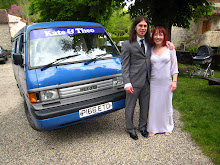We loved Porto, but mindful of our limited time in Portugal before going to the Rocket Festival (and that there are a lot of places in Spain we still want to visit before the end of May), we decided to push on towards Lisbon. Our guidebook recommended Coimbra as an interesting city to see and as our new South American friends had also given the place their thumbs up, we decided to call in on route.
The city only has one campsite, but it was easy to find, very reasonably priced, has good, clean facilities and a regular bus into town - perfect. It also had the biggest European mix of clientale we'd encountered so far, with fellow campers including Dutch, French, Spanish, Portugese, German and another English couple. AND the young woman on reception spoke some English, so that made everything much more straightforward.
It was very hot in the afternoon - Theo chose to spend it snoozing in Sheena while I mooched around doing domestic things like the washing up and wrestling unsuccessfully with the campsite clothes washing machine. Eventually, I gave up, went and got my three Euros back from reception, only to return and witness one of the Dutch women sticking a load on in nary a blink of the eyes. I've noticed Dutch people seem to be very efficient campers (well, motorhome enthusiasts) - next time I want to do some laundry I think I will lassoo a Netherlander first. It could save me a lot of frustration.
We took the bus into Coimbra for the evening after the inevitable confusion buying tickets - not only does every country have its own system, but as we've discovered in Portugal, every city and individual bus firm does the business of ticket buying and stamping (or not) and return issuing (or not) in a different manner as well. Rather baffling to the unwary foreign traveller, but don't let that put you off. Without taking the bus, how would you get to see the scruffiest suburbs and lowliest housing estates of all these proud cities? It's also cheap and you can get all the thrills of a fairground ride with some of the more gung-ho drivers.
Coimbra is a city with a university at its heart. King Dinis gifted his Coimbra palace to the institution and it's been established in the city since the early thirteenth century. The buildings are crumbling but still impressive, with the university precincts dotted with statues and steeped in a long, proud history.
The town itself has a multitude of steep, narrow streets, lined with tall appartments, many of them tiled in patterns of blue and green and festooned with their residents' drying clothes. We spent a happy hour or so wandering round (after the obligatory cafe pingo and cup of hot chocolate taken outside a cafe beside the Santa Cruz monastery, itself a rather beautiful converted chapel) before going to the Restaurante Jardim da Manga for some food. We were greeted by a very friendly, English-speaking waiter, Diago, who guided us through the vegetarian options at the cafeteria-style sevice counter. We ate our huge platefuls outside beside the water garden, formally laid out with heavily-laden citrus trees dropping their fruit into the quartet of fountains. We got complimentary glasses of port (yay!) and the whole thing cost less than fourteen Euros.
While at the top of the town during our walk, we'd noticed what looked like a festival laid out in the city's riverside park. It turned out Coimbra was midway through it annual student extravaganza, Queima das Fitas. Essentially, ten days of each faculty celebrating that year's graduation with an eclectic mix of live music, beginning after midnight and ending with traditional Portugese Fado.
Having encountered Fado already through seeing Mariza at WOMAD (the stylish young Fado singer, who has almost single-handedly opened it up to the rest of the world) and then Dona Rosa (who I preferred), I was interested to catch some live. Coimbra's most succesful bar is aCapella, where they put on shows every night in a fourteenth century monument. For ten Euros a head you got three shows, explanation and background to the music in Portugese and English and a drink. We got a jug of sangria, which lasted us the night and watched two young guys, one on Portugese guitar, the other on English classical guitar, deliver a beautiful and intricate set of ballads, serenades and dances. They had a singer with them, who was less impressive - not bad on the more uptempo numbers, but tended to confuse emotion for volume on the slower more melancholy songs and had all the over-bearing vibrato of the lead tenor in a small town, church choir.
Nonetheless, it was an enjoyable couple of hours and I was interested to learn that every year each faculty at Coimbra university composes a new fado song so the students can say their farewells. Some of these have become incredibly well-known throughout Portugal and the finale was the 1958 Medical Faculty fado, which had the Portugese members of the audience all singing along...a lovely moment.
When we got outside, this year's graduates had filled Coimbra's streets, many of them still wearing their black graduation gowns with badges sewn on, scout-style. We contemplated joining the celebrations and going along to the party in the park, but all that sangria and dolorous Fado had made us feel sleepy, so we got a taxi back to the campsite. Tomorrow if it's hot, we decided, we would get our laundry done and go canoeing while it was drying and maybe head to the beach later on.
We woke this morning to the familiar sound of raindrops pattering onto Sheena's roof. Nah, we'll get on the road to Lisbon and the laundy will have to wait.
Wednesday, 7 May 2008
Subscribe to:
Post Comments (Atom)




No comments:
Post a Comment